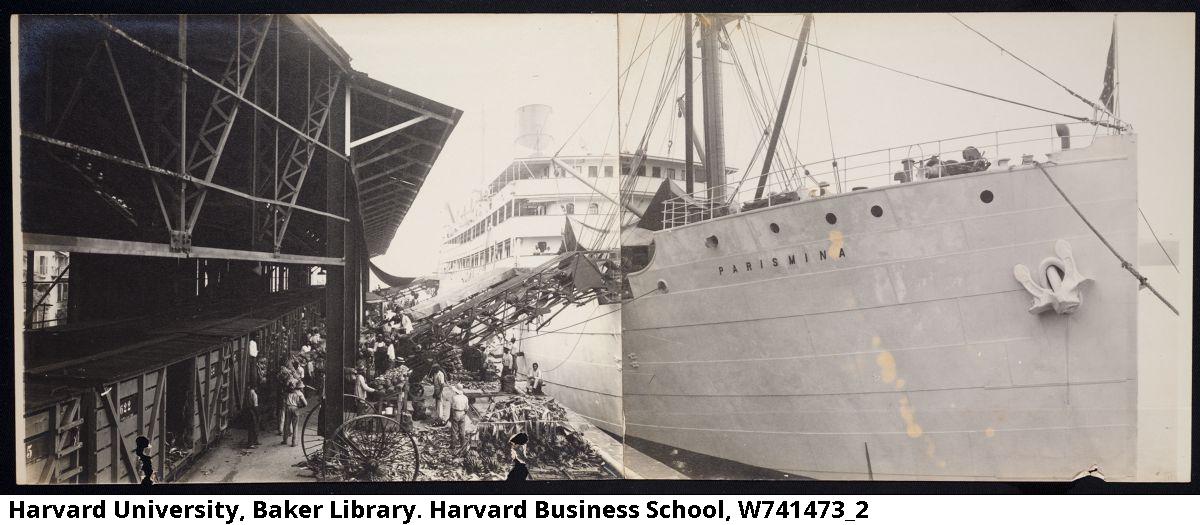Modern Latin America
Latin American history from the 1830s to the present. The course will emphasize the difficult problems encountered by Latin American nations forced to face the demands of the modern world with political, economic, and social institutions developed in a colonial past.
Wooster Degree Requirement Designations: HSS; Cultural Perspectives (C); Diversity, Power, & Privilege (D), Global Engagement (GE)
Spring 2023
M/W/F 12:00-12:50 in Kauke 244

email me
Book Me
Schedule
Wikipedia
Dr. Holt’s Office Hours
Tuesday 10-11am, Wednesday 10-11am, Friday 1-2pm, or by appointment
Class Information
Overview
What will I learn?
- Identify and discuss key people, historical events, institutions, and global networks that shape Latin American history and culture (Graduate Quality: Global Engagement)
- Explain how ethnic identity, race, gender, and class intersect to shape a diversity of individual experiences in Latin America. (Graduate Quality: Justice & Social Responsibility)
- Evaluate diverse interpretations of Latin America and its peoples in primary and secondary sources.
- Use the skills of historians – including research, analysis, and interpretation – to create their own interpretations of Latin America history.
- Analyze the historical construction and maintenance of Latin American systems of inequality as well as measures to counter them.
- Use digital public history tools to communicate your knowledge about Latin America to a wider public audience. (Graduate Quality: Effective Communication)
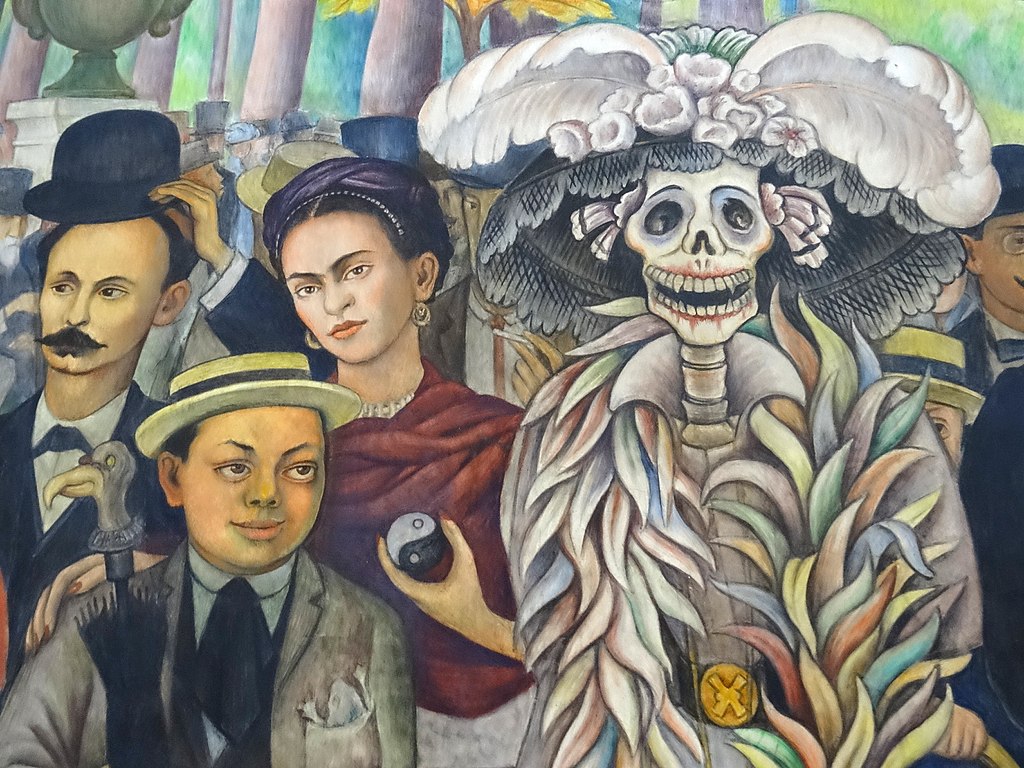
Course Materials
Readings

We have two required books this semester. Both are available for purchase through the campus bookstore, or on 2-hour reserve at the library.
- Mariano Azuela, The Underdogs. New York: Penguin Classics, 2008. ISBN 9780143105275
- John Charles Chasteen, Born in Blood & Fire. New York: WW Norton & Co, 2016 (4th edition). ISBN: 9780393283051
- Additional articles and primary sources readings will be available linked from the syllabus.
Latin American Films
We’ll watch six different Latin American films this semester. All are available streaming.
Ixcanul
Guatemala 2016
Motorcycle Diaries
Brazil 2004
I am Cuba
Cuba 1956
Clandestine Childhood
Argentina 2011
The Chambermaid
Mexico 2019
Queen of Lapa
Brazil 2020
How You’ll be Evaluated
Specifications Grading

This class follows an “ungrading” model called specifications grading.
Assignments are “bundled” into tiers that reflect the hierarchy of learning goals for the course, from basic content knowledge and skills that all students in the course should master to higher order critical and creative understanding that some students more engaged in the subject matter, or with more bandwidth available this semester, may wish to master. Final grades are assigned based on which bundles of assignments a student satisfactorily completes, and indicate which learning goals students demonstrate that they accomplished.
The advantage of this grading method is that each individual student decides how much work they wish to do for our class: if you complete your contracted work on time and meet all assignment criteria, you will receive the grade for which you contracted.
Most assignments will be assessed on a two-point scale as “Does not meet Criteria” or “Meets Criteria.” I’ll use a clear rubric to evaluate whether a student has demonstrated achievement the assignment’s stated learning goals and provide explicit feedback.
Achieving a “meets criteria” grade on an assessment will be earned when the submitted work meets the list of specifications (“specs”) for that assessment. If you don’t meet every requirement for any aspect of the assignment, you’ll earn a “Does not meet criteria.” However, I’ll provide clear feedback on what you need to improve, and there are opportunities built in for you to revise and resubmit your work for full credit using a token.
Your final course grade will be determined by the successful completion (i.e. meeting all assessment specs) of the minimum indicated number of assessments, as described your grading contract. Any student that does not meet the minimum of the requirements for a C will receive a D or F.
Late Work
Tokens
Each student gets three (3) tokens to start the semester. You are free to exchange your tokens for:
- an opportunity to revise and re-submit an assignment that did not meet specifications. You have up to 1 week from the date I give you my feedback to revise and resubmit.
- to get a 48-hour extension on the Travelogue Project, Latin American in the News, Moodle Reading Quiz, Wikipedia Entry, or Prospectus. (Because of the time-sensitive nature of other assignments, you can’t use tokens to get “no questions asked” extensions on Latin American Voices work, Film Critiques, rough drafts/peer review, or your final exam project.)
You control your tokens and can decide when and how to use them. One token = one opportunity for revision. One token = one 48 hour extension with no questions asked.
Will some students need extensions? Absolutely. I’m hoping that we are all healthy. I’m hoping that our families are healthy. But things can be unpredictable. So go head and ask for an extension. It never hurts to ask. But remember, you have tokens. I might say to use one. We’ll figure out how to balance life and your success at Wooster.
You’ll have the opportunity to earn additional tokens by attending campus events related to course themes. I’ll announce these opportunities in class, and if you decide to attend, please just fill out the “Bonus Token” form explaining your participation.
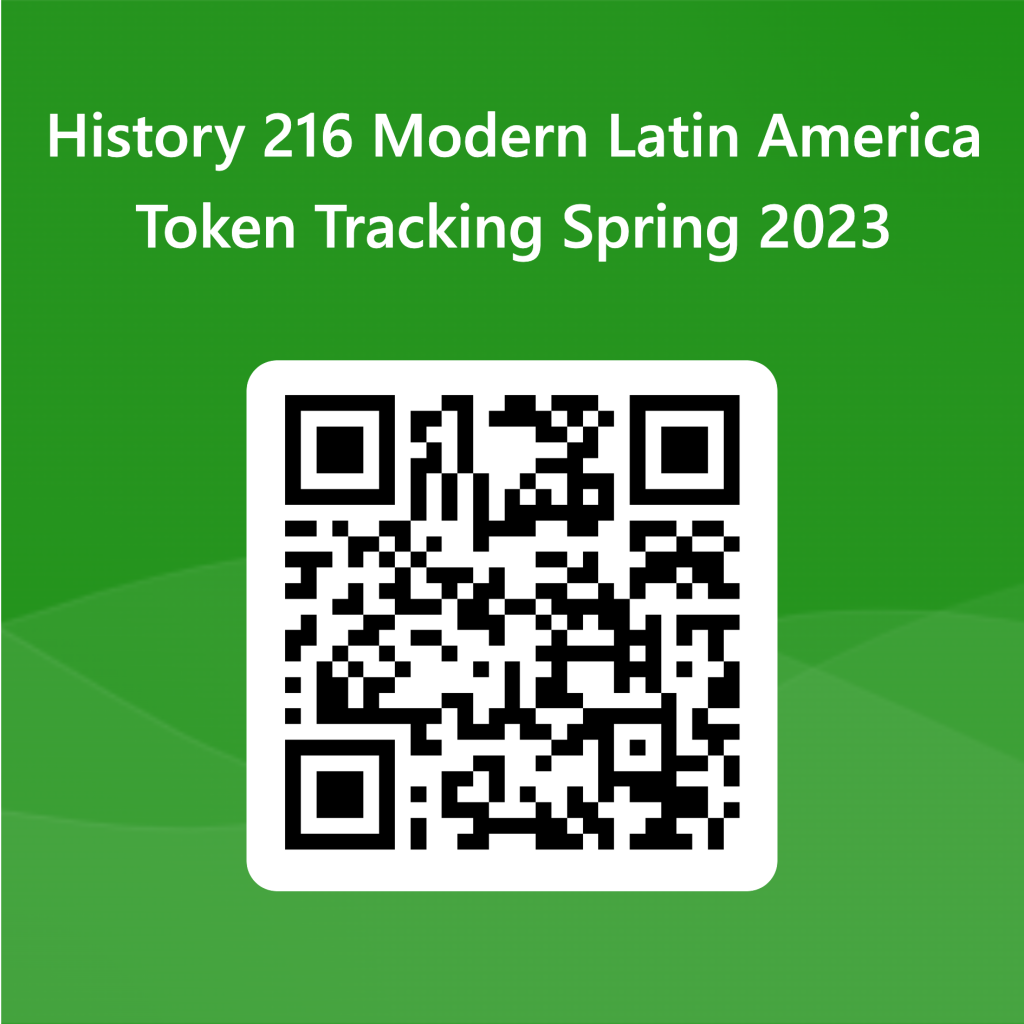
Assignments
Tips
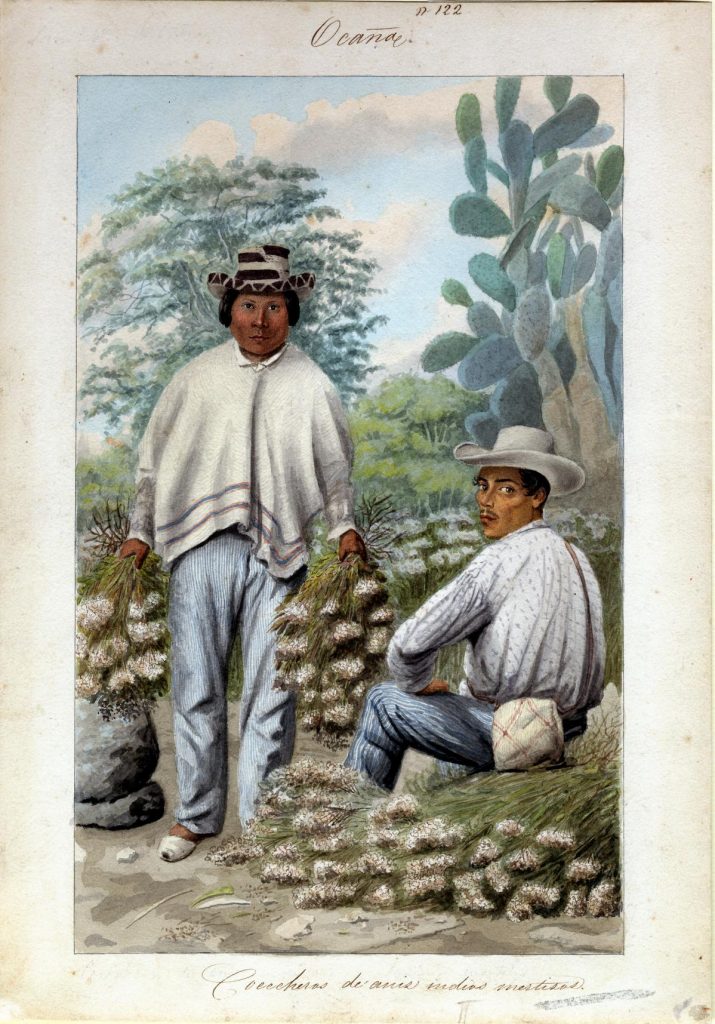
How to Succeed
Reading before Class: Read actively and attentively. Pay careful attention to the text. Underline passages of interest, write keywords and questions in the margins, look up words you don’t know. Keep up with the Moodle Reading quizzes: they help you learn the material. Bring your notes, responses to reading questions, texts, and questions to seminar. These will be the basis of much of our in-class discussions and out-of-class writing assignments. Bring a curious mind to the materials.
Participating in Class: Hearing from our entire class will enrich our shared experience by bringing in a diversity of perspectives. Come to class prepared with your readings, notes, and observations to contribute to our learning. Do not use your phone or laptop in class unless I ask you to use them for a specific activity. Don’t be afraid of getting something wrong in discussion. Everyone will, and we’ll learn together. Bring a notebook, and take notes on our class discussion.
Approaching our Course Work: Each unit of the class builds on the last. Students need to be willing to try new things, exploring different ways of communicating and the use of new technologies. This requires creativity, but also a commitment to do the work to learn new tools, keeping up with the scaffolding to build skills over the course of the semester. While this scaffolding will help you learn new things, it does mean that it can be hard to do well on later assignments if you are missing earlier skills. You need to be willing to share work in progress and get constructive feedback to revise and improve your final product. Schedule your time carefully, and come see me early if you need help.
Communication & Campus Connections: Meet with your professors frequently. Take advantage of support services offered by APEX, the Learning Center, and the Writing Center. We’re here to help you succeed. Let me know if you have questions, concerns, or if there is anything I can do to support your learning.
Classroom Atmosphere & Expectations
This course is designed to provide and maintain an environment that is conducive to learning for all students. We will work together to encourage the free exchange of ideas in an environment of respect and civil discourse. Inappropriate comments or behavior can sometimes seriously undermine that environment. For example, while students and faculty are encouraged to debate ideas and offer differing viewpoints, even when these exchanges are uncomfortable, they should recognize that personal attacks are unacceptable. Steps to address disruptive or disrespectful behavior and assure that all students are able to participate fully in their academic pursuits are outlined in the Classroom Atmosphere Policy, located in both The Scot’s Key and The Faculty Handbook (Chapter 3). A pattern of disruptive behavior will be addressed jointly by Deans of the offices of Academic Affairs and Student Affairs.
Names,Pronouns, & Pronunciation
All people have the right to be addressed and referred to as they prefer. I will do my best to address and refer to all students by the names and pronouns that they share in class, regardless of what is listed on the roster, and I support classmates in doing so as well. I would like for you to refer to me as Dr. or Professor Holt. I use she/her/hers pronouns. Please share the name you prefer to be called and pronouns you wish to use in this class with me via classroom introductions or privately.
I encourage everyone in this classroom to create a space of mutual respect and support by also giving each other some grace around pronouns, pronunciation of names, etc., if or when we make mistakes. This is not at all to absolve anyone of responsibility for using correct pronouns, names, and pronunciations. But I find it useful to acknowledge that even with the best of intentions, sometimes we can all still make mistakes.
Trigger Warnings
As the list of topics suggests, some of the historical events we’re studying this semester are difficult and disturbing. I understand that this can – and indeed, should – be troubling to read and discuss. However, the practice of historical empathy and bearing witness to the lived experiences of others is key what we’re doing as historians, and thus participants in this course will not be able to avoid it. Please carefully review the syllabus, and come talk with me ASAP if you believe that the course material will be too difficult for you to work through.
Recording Class
The materials on this course and shared on the Moodle site are only for the use of students enrolled in this course for purposes associated with this course and may not be further distributed.
I may record some of our discussions this semester: I will always notify everyone present if I am recording.
Any video or audio recording and other course materials are to be used for educational purposes only and are meant only for students currently enrolled in the course. No one may distribute recordings, screenshots, or other class material beyond class without the express permission of all involved in the recording. College classrooms are places to test out new ideas, challenge assumptions, and engage timely and sometimes sensitive issues. Students who enter this space should be able to do so with the assurance that their comments will not be shared beyond the classroom.
No student may record or tape any classroom activity without my express written consent (and the notification of all students involved).

Campus Resources for Success
Learning Resources
Libraries and Research Help Desk
Contact
Your librarian for this course is Denise Monbarren. You can ask your librarian for help with research in this class and can make an appointment with them using the research consultation form for help with your research and information needs, including finding and using items we have in the Libraries; learning expert tips to refine your search for articles in magazines, journals, and newspapers; making an appointment with a librarian for help on a project; and learning how to evaluate the information you discover.
Academic Resource Center (ARC)
The Academic Resource Center, which is in APEX (Gault library) offers a variety of academic support services, programs and 1:1 meetings available to all students. Popular areas of support include time management techniques, class preparation tips and test taking strategies. In addition, the Academic Resource Center coordinates peer-tutoring for several academic departments. Students are encouraged to schedule an appointment.
An additional support that the Academic Resource Center offers is English Language Learning. Students can receive instruction or support with English grammar, sentence structure, writing, reading comprehension, reading speed, vocabulary, listening comprehension, speaking fluency, pronunciation, and American culture through 1:1 meetings with the Academic Resource Center staff, ELL Peer Tutoring, ELL Writing Studio courses, and other programming offered throughout the year.
The Academic Resource Center also coordinates accommodations for students with diagnosed disabilities. At the beginning of the semester, students should contact the Academic Resource Center to make arrangements for securing appropriate accommodations. Although the Academic Resource Center will notify professors of students with documented disabilities and the approved accommodations, students are encouraged to speak with professors during the first week of each semester. If a student does not request accommodations or does not provide documentation to the Academic Resource Center, faculty are under no obligation to provide accommodations.
The Writing Center
The Writing Center provides professional tutors who work with you to help clarify your thinking and improve the communication of your ideas. They can help at all stages of writing, from planning to drafting to revision. I encourage you all to take advantage of this wonderful, free resource for any of your writing assignments.
Location: Andrews Library Level 1.
Hours: Sunday 6-9, Monday – Thursday 9-5 & 6-9, Friday 9-4, Saturday: closed
Appointments: Walk-in consultations are accepted, but you are encouraged to schedule an appointment online or by calling extension 2205.
Digital Media Bar
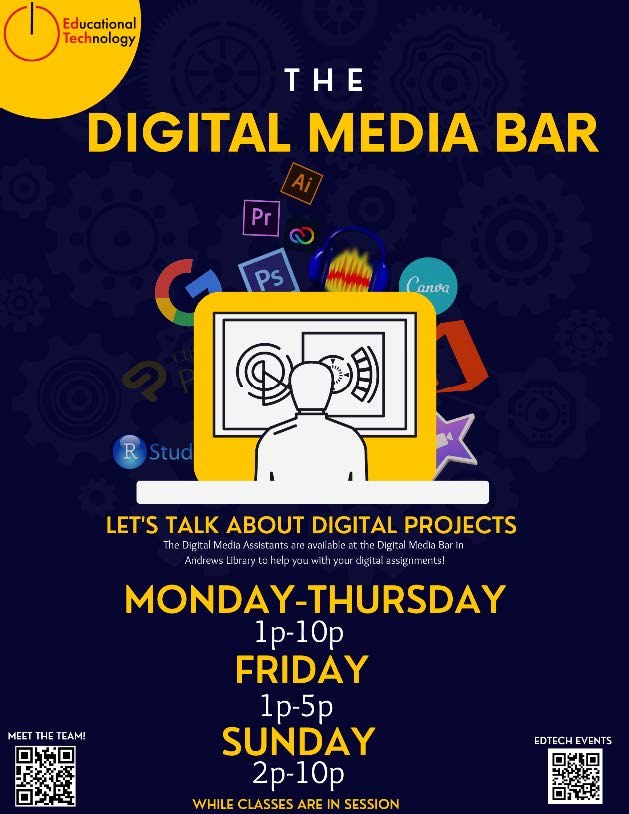
Digital Media Assistants staff the Digital Media Bar in Andrews Library and are responsible for answering basic software questions about Microsoft 365 and Moodle, assist with our equipment housed in CoRE such as our 3D printers, and provide support to students in planning and completing digital media assignments such as podcasts, videos, and posters. Students also help perform basic troubleshooting in the Digital Studio when necessary.
- Digital Media Assistants are available at the Digital Media Bar (DMB) Sunday – Thursday from 1 – 10 p.m. and Friday 1 – 5 p.m. when classes are in session or via a Teams meeting.
- You can schedule an appointment using Bookings with them to meet at the DMB or in Teams.
Academic Planning
Do you want to talk with someone about your course selection, potential majors, or your educational goals? Would you like help with developing personalized strategies for enhancing your academic learning? Stop by the front desk in APEX or click on a link below to schedule an appointment with one of our APEX Advisors. And remember, drop in appointments are available during Walk-in-Wednesdays 1:30 – 4:00.
Use these links to schedule a meeting with Krista Martin or to schedule a meeting with Dr. Mark Graham.
Learning Accommodations
The Academic Resource Center (ARC) works to ensure that students with disabilities have access equal to that of other students across their collegiate experience. Toward this mission, we provide individual accommodations and services that are designed to build an accessible and inclusive campus community. In conjunction with Disability Support Services, the ARC staff supports all students in developing academic skills, learning about campus resources, and empowering students with ownership as they navigate their collegiate education. If you have inquiries regarding Disability Support Services, consult the Disability Support Services page of the ARC website for more information.
Peer Tutors
Peer Tutors can help you achieve your academic goals in a specific class. Peer Tutors can help you understand assignments, explain the key concepts of course materials, offer feedback and encouragement, and share appropriate resources. Tutoring sessions are individual, weekly, and one-hour long.
Peer Tutors have excelled in their coursework, been nominated by their professors, and have been trained through the Academic Resource Center’s Peer Tutor curriculum.

Other School Policies
Academic Honesty and the Code of Academic Integrity
The academic program at the College seeks to promote the intellectual development of each student and the realization of that individual’s potential for creative thinking, learning, and understanding. In achieving this, each student must learn to act rigorously, independently, and imaginatively.
The College’s understanding and expectations in regard to issues of academic honesty are fully articulated in the Code of Academic Integrity as published in The Scot’s Key and form an essential part of the implicit contract between the student and the College. The Code provides framework at Wooster to help students develop and exhibit honesty in their academic work. You are expected to know and abide by these rules.
Dishonesty in any of your academic work is a serious breach of the Code of Academic Integrity and is grounds for serious penalties. Such violations include turning in another person’s work as your own, copying from any source without proper citation, violating expectations for a group project, submitting an assignment produced for a course to a second course without the authorization of all the instructors, and dishonesty in connection with your academic work. You will be held responsible for your actions. Particular attention should be directed to the appropriate use of materials available online. Whether intentional or not, improper use of materials is a violation of academic honesty. If you are unsure as to what is permissible, please contact your course instructor.
Conflicts with Academic Responsibilities
The College of Wooster is an academic institution, and its fundamental purpose is to stimulate its students to reach the highest standard of intellectual achievement. As an academic institution with this purpose, the College expects students to give the highest priority to their academic responsibilities. When conflicts arise between academic commitments and complementary programs (including athletic, cultural, educational, and volunteer activities), students, faculty, staff, and administrators all share the responsibility of minimizing and resolving them.
As a student you have the responsibility to inform the faculty member of potential conflicts as soon as you are aware of them, and to discuss and work with the faculty member to identify alternative ways to fulfill your academic commitments without sacrificing the academic integrity and rigor of the course.
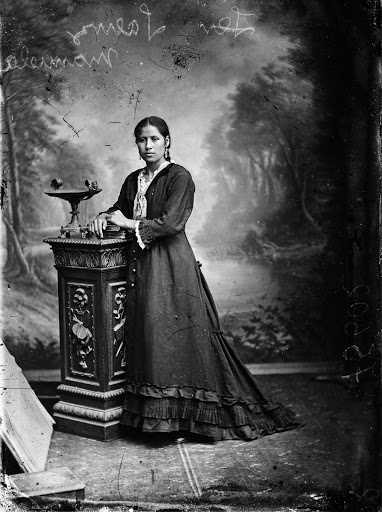
Discriminatory or Bias Reporting
Contact: Visit the Bias Reporting website
The College of Wooster is committed to promoting its mission of inclusivity and equity in all aspects of the educational enterprise. This commitment extends to all rights, privileges, programs and activities, including housing, employment, admissions, financial assistance, and educational and athletic programs at the College. The College’s Bias Incident Reporting Process is designed to effectively respond to bias concerns raised by faculty, students, staff, alumni and visitors to the College. If you or someone you know are the victims of bias, you can:
- File a report online (where you may choose to identify yourself or not)
- Contact Campus Safety: 2590 (from campus phone) or 330-263-2590
- Call the Anonymous Tip Line: 2337 (from campus phone) or 330-263-2337
- Contact the Dean of Students Office: 2545 (from a campus phone) or 330-263-2545
- Contact the Vice President for Equity, Inclusion, and Diversity Cheryl Nuñez at 330-263-2356
Title IX Reporting
Contact: Joe Hall, jhall@wooster.edu, Title IX website
The College of Wooster is committed to fostering a campus community based on respect and nonviolence. To this end, we recognize that all Wooster community members are responsible for ensuring that our community is free from discrimination, gender bias, sexual harassment, and sexual assault. In accordance with Title IX, Wooster is legally obligated to provide supportive options for all reports of sexual harassment and sexual assault that occur on our campus. Faculty who become aware of an incident of sexual violence, including harassment, rape, sexual assault, relationship violence, or stalking, are mandated reporters at the College and are required to notify Wooster’s Title IX Coordinator. The purpose of this disclosure is to ensure that students are made aware of their reporting options and resources for support. For more information about your rights and reporting options at Wooster, including confidential and anonymous reporting options, please visit here.
Course Withdrawal Options
Students may withdraw from a course after the 6th-week drop deadline until the last day of classes (Tuesday, May 9, 2023 in Spring 2023). Students may withdraw from one course, up to 1.25 credits, at any time through the last day of classes, as long as their total remaining credits are 3.0 or above. This may be done without documentation of extenuating circumstances. Requests to drop enrollment below 3.0 credits will require additional documentation through a Petition for an Exception to an Academic Policy.
Note that because federal government guidelines define courses as ‘attempted’ after 6 weeks, if a student withdraws from a course after 6 weeks, it will be noted as a ‘W’ on their transcript.
Final Examinations
No final examinations are to be given during the last week of classes or on reading days. Students who wish to reschedule a final exam must submit a petition to the Dean for Curriculum and Academic Engagement in advance of the examination. The student must confer with the instructor before submitting a petition, and the instructor should indicate to the Dean if they support the petition. Normally, such petitions are granted only for health reasons. If other reasons necessitate a request for a change in a final exam, the request must be submitted three weeks in advance of the examination. Find electronic petition forms on the Registrar’s website.





